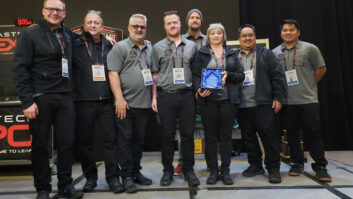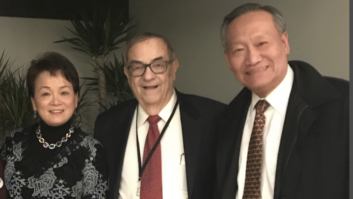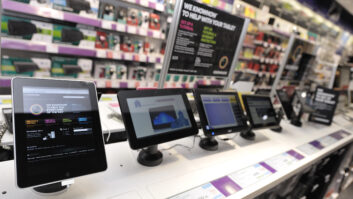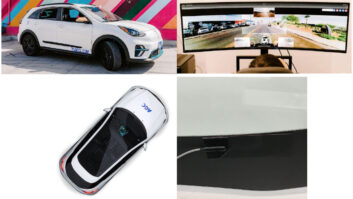New York — Two top CEOs in the consumer electronics industry who didn’t aspire to their current jobs were the stars of their own TV at Baruch College, here, on March 14 where they discussed their careers, management styles and the CE industry in general.
Sir Howard Stringer, chairman/CEO of Sony, and Brad Anderson, vice chairman/CEO, were given the opportunity thanks to the PBS program CEO Exchange. The show, hosted by veteran TV journalist Jeff Greenfield, which will begin its season on Wednesday, April 4. (The air date of this program has not been set yet.)
Stringer was up first, and when asked by Greenfield how it felt to be the first non-Japanese chairman of Sony, he said, “I’m the accidental occidental,” explaining that he never really aspired to be a CEO. He said when he was with CBS News, “I was happy writing!” Eventually he became the producer of “The CBS News With Dan Rather” when it was No. 1 network news program.
Stringer said that when he was at CBS it was similar to today’s Sony, “Both are creative companies with people who are proud of the company’s values and integrity. When I was at CBS there was a feeling that it was about more than just making money.”
He had his first taste in the executive suite when investor Lawrence Tisch took over CBS, named him president of the network and ordered him to make cutbacks. “I never had to cut jobs before.” Around 150 CBS veterans were fired and Stringer said, “It was a miserable experience.”
Stringer joined Sony in 1997 and became chairman/CEO of Sony Corp. of America the following year. When he was named to head the worldwide parent firm Sony in 2005 he saw what he called “silos” because of Sony’s vertical integration. “Each product category was its own ‘silo.’ PlayStation was a silo. All the divisions were in their own little words. There was no sharing of information between these divisions and little acknowledgement of software.”
What he did was to try and break down the silos with a program called “Sony United,” which, Stringer said, “was not original and sounds like a [soccer] team.” But the program got Sony engineers from across the company to begin talking to each other and sharing experiences.
He explained that Sony “has 30,000 products. We have highly skilled hardware and software engineers. We knew what we wanted to do but didn’t know how to execute the vision.”
Greenfield reminded Stringer that Sony had its own version of iPod in the works before Apple did. The Sony chairman explained, “In 1997 we were working with IBM on electronic music distribution and could have put this out five years earlier [than iPod]. But we couldn’t get our people to understand software. And we are a music company. They saw digital media, panicked and didn’t like it.” In the end Sony designed a closed music system that didn’t work.
In talking about current products, when asked about Apple’s iPhone Stringer said, “The good news is that Steve Jobs spotted a trend that we’ve seen. The phone is a convergence device, between music and a phone. We are all building variations on the same theme. We have sold plenty of Walkman phones [from Sony Ericsson], especially in Europe.”
While Stringer is pleased with Sony’s cellular phone progress, “I would never sit up here and say I’m not worried about Steve Jobs. I wouldn’t bet against Steve.”
About Blu-ray vs. HD DVD, Stringer was more pointed: “We are selling 3-to-1 vs. them. We have exclusives with Disney, Fox, Sony [and Lion’s Gate] and they have the top 15 of 20 movies at the moment. At some point Blu-ray will take over based on … this support.”
He described HD DVD as a “transitional technology” that has “an exclusive with Universal … so good luck to them. When hit titles came out last year, more came out on Blu ray.”
And when asked about the popularity of Nintendo’s Wii vs. PS3 during last year’s holiday season, Stringer noted, “Wii is a wonderful device, but has a different target audience. If we fail, it is because we positioned PS3 as the Mercedes of the video game field. PS3 is after a different audience and it can be whatever it wants — a home server, game device, even a computer.”
Brad Anderson, whose low-key demeanor is well-known, was described in a video report during the program as the “most unlikely of CEOs,” and his background illustrated that description.
He related the story about how he became a manager at Sound of Music, the precursor of Best Buy. By his own admission Anderson wasn’t the greatest floor salesman. He was so discouraged at one point that he tried to quit but his boss stopped him. Founder Dick Schulze came to the store and asked to speak to Anderson in the parking lot and the current vice chairman of Best Buy told the audience, “I thought he was going to fire me! I thought he took me outside so I wouldn’t cry in front of everyone.”
Instead Schulze asked him who should be the new manager of the store. In an answer that Anderson remarked was “completely out of character,” he said, “Me.” Schulze agreed as he discussed with Greenfield, that answer changed his life.
With a background on the front line as a sales associate, you could see that the consumer centricity program that allows store personnel to be involved in the decision-making process was not a big leap in faith for someone like Anderson vs. other CEOs.
When asking about Anderson’s frequent visits to Best Buy stores, Greenfield cracked that much of this CEO’s time is devoted to being “either a coach, mentor or bully” to many store employees every month. “You have to understand that everyone has a gift. If you are a leader, you have to find out what the gifts of members of your team are.” And he added, “What motivates people is different with everyone. To some it may seem like bullying, but to others it might seem like mentoring or coaching. You try to see what works for each person.”
Anderson also believes that looking outside the industry and coming up with different ideas are critical to a company’s continued success. He related a story about the opening and closing of food stores in his hometown of Minneapolis when he was growing up. He always wondered why it was happening. Now Anderson realizes, “What makes you win today will kill you tomorrow. You constantly have to find the ‘next offer.”
For instance, he said, “Ten years ago we thought of ourselves as the agent of the supplier. Now we think, ‘What are consumers doing with this product? How will they use the product?’ That’s how we developed consumer centricity.”
Best Buy is also rethinking how and when its employees go to work with its “results-oriented work environment,” or ROWE, where workers develop their schedules with their managers in advance. Anderson said that this has happened with executives but it is also important “especially for those in the early stage of their careers.” It enables the chain to attract more workers and create more loyalty to the company.
The idea was developed via the blue-shirted rank and file at Best Buy, not at corporate headquarters. When asked by Greenfield what would have happened if the idea would have presented to him there, “I would have said, ‘How will it affect discipline?’ I’m glad the idea came up the way it did.”













